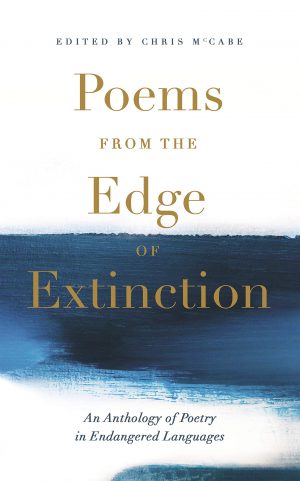Poems from the Edge of Extinction edited by Chris McCabe is a small cross-section of world poetry with a difference; every poem in this collection is written in a language that is endangered, at risk of extinction. It began with the idea to collect poetry written in the world’s dying languages and became an exhibition at the National Poetry Library in 2017, The Endangered Languages Project.
I found it challenging to balance two radical dualities when reading this collection; the poem on the left written in an endangered language, and the translation on the right written in English. Poetry written in an endangered language is, by its nature, only accessible to the dwindling number of speakers and readers of that language. As English is a global language, anything written in English or translated into English becomes instantly accessible to billions of people worldwide.
And yet the book encourages us to attempt to read the original work, helped by a page of explanatory notes for each poem on the language and the poet. My technique involved looking for patterns: repeated words, question marks, a pattern of longer or shorter lines, rhyme and alliteration, then cross-referencing it with the English version for meaning. I found through this method a small way of fighting the hold my language has over meaning.
The anthology is constructed around continents: Africa, the Americas, Asia, Europe, Middle East and Oceania. This creates a recognisable structure for the reader and allows us to move between regions rather than reading it lineally. Everywhere it urges you to make connections between the extinction of language and the extinction of species and between the languages themselves, encouraging us to consider our relationship, and therefore responsibility, to the writers and speakers of these languages.
Some poems cannot be reproduced in the original language they were created in. The poem ‘Lovesong’ was transcribed and translated from a song in the Rohingya language, which does not have a recognised written script.
You catch yourself slipping and falling
on the narrow road,
a black water jug – cracked on a dark night.
Often poems have been chosen that draw attention to the translation, to the nature of translation and what is lost (or gained). Valzhyna Mort’s poem ‘Belarusian 1’ is a stark response to the political eradication of her language in Belarus:
When we discovered that we ourselves were the language
and our tongues were removed, we started talking with our
eyes.
The introductions by Martin Owen, Mandana Seyfeddinipur and editor Chris McCabe, as well as the detailed notes on the languages and poets, put the poetry in context. As with the pages of notes for each poem, this is invaluable. And yet, despite the different contexts of each language and poet, what you are left with is a sense of universality. Among many others, the themes of the poems cover loss, desire, belonging, love and truth.
Hopefully more readers will be drawn to this anthology. It feels like an exceptional, important work of translation that comes not a moment too soon.
Poems from the Edge of Extinction edited by Chris McCabe is published by Chambers, 288 pages.





